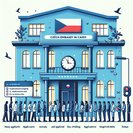
Czech authorities have unveiled a five-year ‘special long-term residence’ permit aimed at Ukrainians currently living in Czechia under the EU Temporary Protection Directive. The scheme, confirmed by the European Commission’s migration directorate on 21 November, is designed to give qualified applicants a longer planning horizon as the temporary-protection regime approaches its sunset date.
Eligibility is stringent: applicants must show untaxed annual income of at least CZK 440,000 (about €18,000) plus CZK 110,000 per dependent, secure housing, and a clean criminal record. Successful holders may work freely without labour-market tests, travel within Schengen for 90/180 days and, after five years, transition to EU long-term residence.
![Prague Introduces Five-Year ‘Special Long-Term Residence’ for Displaced Ukrainians]()
Interior-ministry data indicate that more than 82,000 of the roughly 330,000 Ukrainians under protection have expressed interest; about 20 percent are already pre-approved, most of them economically active adults. The government is simultaneously raising humanitarian benefits for disabled Ukrainians and funding regional housing contact points through the International Organization for Migration.
For employers the permit removes significant uncertainty. Ukrainian staff will no longer need to renew temporary-protection documents annually, reducing HR administration and allowing longer assignment cycles. HR departments should, however, remind employees that applications must be filed before their current status expires and that 2025 income will be verified against tax returns.
Integration stakeholders welcome the move but warn that processing volumes could overwhelm migration offices. The Interior Ministry has pledged additional staff and an on-line booking system by January to manage demand.
Eligibility is stringent: applicants must show untaxed annual income of at least CZK 440,000 (about €18,000) plus CZK 110,000 per dependent, secure housing, and a clean criminal record. Successful holders may work freely without labour-market tests, travel within Schengen for 90/180 days and, after five years, transition to EU long-term residence.

Interior-ministry data indicate that more than 82,000 of the roughly 330,000 Ukrainians under protection have expressed interest; about 20 percent are already pre-approved, most of them economically active adults. The government is simultaneously raising humanitarian benefits for disabled Ukrainians and funding regional housing contact points through the International Organization for Migration.
For employers the permit removes significant uncertainty. Ukrainian staff will no longer need to renew temporary-protection documents annually, reducing HR administration and allowing longer assignment cycles. HR departments should, however, remind employees that applications must be filed before their current status expires and that 2025 income will be verified against tax returns.
Integration stakeholders welcome the move but warn that processing volumes could overwhelm migration offices. The Interior Ministry has pledged additional staff and an on-line booking system by January to manage demand.








